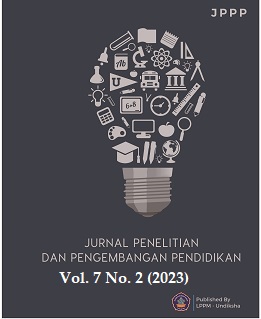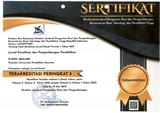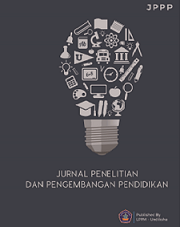Problem Based Learning Model with Experiential Learning to Increase Creative Thinking and Critical Thinking Ability
DOI:
https://doi.org/10.23887/jppp.v7i2.62254Keywords:
Models of Problem Based Learning, Experiential Learning, Creative Thinking, Critical ThinkingAbstract
The problem of students' creative thinking and critical thinking skills in science learning still needs to improve, and more teachers must apply innovative learning models. This study aimed to analyze the effect of the problem-based learning model assisted by experiential learning in developing students' 21st-century thinking skills, namely creative thinking and critical thinking in science learning. This type of research is qualitative. The research method used in this research is quantitative, namely quasi-experimental. There are two research samples experimental class and the control class. Data collection methods are done through interviews, observations, tests and documentation. The analysis technique used is a normality test, homogeneity, T-test, and multivariate test with MANOVA. The results showed a significant increase in the posttest results of student's creative thinking and critical thinking skills after applying the problem-based learning model assisted by experiential learning. The MANOVA test results show that learning in the experimental and control classes increases in value even though the average differs. It was concluded that the problem-based learning model assisted by experiential learning could improve students' 21st-century thinking skills, namely creative thinking and critical thinking in science learning.
References
Abdullina, L. R., Ageeva, A. V., & Gabdreeva, N. V. (2019). Using the Flipped classroom model in the teaching of the theoretical disciplines (French language) at the university [Technologie de la classe inversee dans l’enseignement des disciplines theoriques (Fle) aux etudiants des universites. XLinguae, 12(1), 161–169. https://doi.org/10.18355/XL.2019.12.01XL.12. DOI: https://doi.org/10.18355/XL.2019.12.01XL.12
Amran, A., Perkasa, M., Satriawan, M., Jasin, I., & Irwansyah, M. (2019). Assessing students 21st century attitude and environmental awareness: Promoting education for sustainable development through science education. Journal of Physics: Conference Series, 1157(2). https://doi.org/10.1088/1742-6596/1157/2/022025. DOI: https://doi.org/10.1088/1742-6596/1157/2/022025
Andarwati, M. (2019). Pembelajaran Sejarah Kontekstual, Kreatif, Menyenangkan di Kelas Dengan “Power Director” bagi Generasi Z. Jurnal Pendidikan Sejarah Indonesia, 2(1), 64–81. https://doi.org/10.17977/um033v2i12019p064. DOI: https://doi.org/10.17977/um033v2i12019p064
Astuti, A. P., Aziz, A., Sumarti, S. S., & Bharati, D. A. L. (2019). Preparing 21st Century Teachers: Implementation of 4C Character’s Pre-Service Teacher through Teaching Practice. Journal of Physics: Conference Series, 1233(1). https://doi.org/10.1088/1742-6596/1233/1/012109. DOI: https://doi.org/10.1088/1742-6596/1233/1/012109
Chung, C. H., Shen, C., & Qiu, Y. Z. (2019). Students’ acceptance of gamification in higher education. International Journal of Game-Based Learning, 9(2), 1–19. https://doi.org/10.4018/IJGBL.2019040101. DOI: https://doi.org/10.4018/IJGBL.2019040101
Devi, M., Annamalai, M. A. R., & Veeramuthu, S. P. (2020). Literature Education and Industrial Revolution 4.0. Universal Journal of Educational Research, 8(3), 1027–1036. https://doi.org/10.13189/ujer.2020.080337. DOI: https://doi.org/10.13189/ujer.2020.080337
Erikasari, E., Agustin, A., & Hidayat, D. (2021). Peranan Refleksi Guru Dalam Upaya Meningkatkan Manajemen Kelas. Johme: Journal of Holistic Mathematics Education, 5(1), 96. https://doi.org/10.19166/johme.v5i1.2124. DOI: https://doi.org/10.19166/johme.v5i1.2124
Fatimah, A. S., & Santiana, S. (2017). Teaching in 21St Century: Students-Teachers’ Perceptions of Technology Use in the Classroom. Script Journal: Journal of Linguistic and English Teaching, 2(2), 125. https://doi.org/10.24903/sj.v2i2.132. DOI: https://doi.org/10.24903/sj.v2i2.132
Ferrer, E., & Staley, K. (2016). Designing an EFL Reading Program to Promote Literacy Skills, Critical Thinking, and Creativity. CATESOL Journal, 28(2), 79–104. https://eric.ed.gov/?id=EJ1119613.
Fox, W., & Bayat, M. S. (2007). A Guide to Managing Research. Juta Publications.
Karuniasih, N. L. A. G. (2022). Exploring Readiness of Teachers Toward English Remote Teaching. Journal of Educational Study, 1(3), 134–149. https://doi.org/10.36663/joes.v1i3.204. DOI: https://doi.org/10.36663/joes.v1i3.204
Khoiri, A., Evalina, Komariah, N., Utami, R. T., Paramarta, V., Siswandi, J., & Sunarsi, D. (2021). 4Cs Analysis of 21st Century Skills-Based School Areas. Journal of Physics: Conference Series, 1764(1), 012142. https://doi.org/10.1088/1742-6596/1764/1/012142. DOI: https://doi.org/10.1088/1742-6596/1764/1/012142
Laila Puspita. (2019). Pengembangan modul berbasis keterampilan proses sains sebagai bahan ajar dalam pembelajaran biologi Module development based on science process skills as teaching materials in biological learning. Jurnal Inovasi Pendidikan IPA, 5(1), 79–87. https://doi.org/10.21831/jipi.v5i1.22530. DOI: https://doi.org/10.21831/jipi.v5i1.22530
Lestari, H. (2020). Peningkatan Pemahaman Nature Of Science (Nos) Siswa Melalui Model Pembelajaran Inkuiri Terbimbing Ditinjau Dari Tingkat Efikasi Diri. Reslaj : Religion Education Social Laa Roiba Journal, 2(2), 219–242. https://doi.org/10.47467/reslaj.v2i2.146. DOI: https://doi.org/10.47467/reslaj.v2i2.146
Lewis, R. (2001). Classroom discipline and student responsibility: : the students’ view. Teaching and Teacher Education, 17(3), 307–319. https://doi.org/10.1016/S0742-051X(00)00059-7. DOI: https://doi.org/10.1016/S0742-051X(00)00059-7
Muhali, M. (2019). Pembelajaran Inovatif Abad Ke-21. Jurnal Penelitian Dan Pengkajian Ilmu Pendidikan: E-Saintika, 3(2), 25–50. https://doi.org/10.36312/e-saintika.v3i2.126. DOI: https://doi.org/10.36312/e-saintika.v3i2.126
Prijanto, J. H., & Kock, F. De. (2021). Peran Guru Dalam Upaya Meningkatkan Keaktifan Siswa Dengan Menerapkan Metode Tanya Jawab Pada Pembelajaran Online. Scholaria: Jurnal Pendidikan Dan Kebudayaan, 11(3), 238–251. https://ejournal.uksw.edu/scholaria/article/view/4318.
Purawati, R., Hobri., & Fatahillah, A. (2016). Analisis Kemampuan Bepikir Kritis dalam menyelesaikan masalah persamaan Kuadrat pada pembelajaran Model Creative Problem Solving. Kadikma, 7(1), 84–93. https://doi.org/10.2331/suisan.35.791. DOI: https://doi.org/10.2331/suisan.35.791
Purwanto. (2020). Metodologi Penelitian Kuantitatif Untuk Psikologi Dan Pendidikan. Pustaka Pelajar.
Rai, P., & Khawas, V. (2020). Traditonal knowledge system in disaster risk reducton: Exploraton, acknowledgement and propositon. Jamba: Journal of Disaster Risk Studies, 11(1), 1–7. https://doi.org/10.4102/JAMBA.V11I1.484. DOI: https://doi.org/10.4102/jamba.v11i1.484
Ratama, I. P., Padmadewi, N. N., & Artini, L. P. (2021). Teaching the 21st Century Skills (4Cs) in English Literacy Activities. Journal of Education Research and Evaluation, 5(2), 223. https://doi.org/10.23887/jere.v5i2.30849. DOI: https://doi.org/10.23887/jere.v5i2.30849
Retnowati, T. H., Mardapi, D., Kartowagiran, B., & Hamdi, S. (2021). A Model of Lecturer Performance Evaluation: Sustainable Lecturer Performance Mapping. International Journal of Instruction, 14(2), 83–102. https://doi.org/10.29333/iji.2021.1426a. DOI: https://doi.org/10.29333/iji.2021.1426a
Ridwan, A., Rahmawati, Y., & Hadinugrahaningsih, T. (2021). Steam Integration in Chemistry Learning for Developing 21St Century Skills. MIER Journal of Educational Studies Trends & Practices, 7(2), 184–194. https://doi.org/10.52634/mier/2017/v7/i2/1420. DOI: https://doi.org/10.52634/mier/2017/v7/i2/1420
Rusdin, N. M. (2018). Teachers’ Readiness in Implementing 21st Century Learning. International Journal of Academic Research in Business and Social Sciences, 8(4). https://doi.org/10.6007/ijarbss/v8-i4/4270. DOI: https://doi.org/10.6007/IJARBSS/v8-i4/4270
Sadiqin, I. K., Santoso, U. T., & Sholahuddin, A. (2017). Pemahaman Konsep IPA Siswa SMP Melalui Pembelajaran Problem Solving pada Topik Perubahan Benda-benda di Sekitar Kita. Jurnal Inovasi Pendidikan IPA, 3(1), 52–62. https://doi.org/10.21831/jipi.v3i1.12554. DOI: https://doi.org/10.21831/jipi.v3i1.12554
Sartono, E. K. E., & Irawati, E. (2020). Child-Friendly Based Lift-the-Flap Story Book: Does It Affect Creative Thinking Ability and Self-Actualization of 4th Grade of Elementary Student? In International Conference on Educational Research and Innovation (ICERI 2019), 116–121. https://doi.org/10.2991/assehr.k.200204.021. DOI: https://doi.org/10.2991/assehr.k.200204.021
Schlegel, E. C., Tate, J. A., Pickler, R. H., & Smith, L. H. (2021). Practical strategies for qualitative inquiry in a virtual world. Journal of Advanced Nursing, 77(10), 4035–4044. https://doi.org/10.29173/iasl7898. DOI: https://doi.org/10.1111/jan.15000
Shebastian, I. G. R. ., Suyasa, I. M. S., & Arta, P. . (2020). Pengembangan Media Pembelajaran Interaktif “ Pengenalan Hewan Dan Tumbuhan ” Pada Mata Metode Gamefikasi Untuk Siswa Kelas Ii Di Sekolah Dasar. Karmapati, 9(1), 8–20. https://doi.org/10.23887/karmapati.v9i1.23270.
Sumarno. (2019). Pembelajaran kompetensi abad 21 menghadapi era Society 5.0. Prosiding SEMDIKJAR (Seminar Nasional Pendidikan Dan Pembelajaran), 3, 272–287. http://ojs.semdikjar.fkip.unpkediri.ac.id/index.php/SEMDIKJAR/article/view/28.
Supriyono, S. (2019). Teachers’ Profesionalism and Challenges in Industrial Revolution Era 4.0. Social, Humanities, and Educational Studies (SHEs): Conference Series, 2(1), 195. https://doi.org/10.20961/shes.v2i1.37645. DOI: https://doi.org/10.20961/shes.v2i1.37645
Takko, M., Jamaluddin, R., Kadir, S. A., Ismail, N., Abdullah, A., & Khamis, A. (2020). Enhancing higher-order thinking skills among home science students: The effect of cooperative learning Student Teams-Achievement Divisions (STAD) module. International Journal of Learning, Teaching and Educational Research, 19(7), 204–224. https://doi.org/10.26803/IJLTER.19.7.12. DOI: https://doi.org/10.26803/ijlter.19.7.12
Tang, T., Vezzani, V., & Eriksson, V. (2020). Developing critical thinking, collective creativity skills and problem solving through playful design jams. Thinking Skills and Creativity, 37(May), 100696. https://doi.org/10.1016/j.tsc.2020.100696. DOI: https://doi.org/10.1016/j.tsc.2020.100696
Williams, M. K., Foulger, T. S., & Wetzel, K. (2009). Preparing Preservice Teachers for 21st Century Classrooms: Transforming Attitudes and Behaviors About Innovative Technology. Journal of Technology and Teacher Education, 17(3), 393–418. https://www.learntechlib.org/primary/p/28216.
Yazar Soyadı, B. B. (2015). Creative and Critical Thinking Skills in Problem-based Learning Environments. Journal of Gifted Education and Creativity, 2(2), 71–71. https://doi.org/10.18200/jgedc.2015214253. DOI: https://doi.org/10.18200/JGEDC.2015214253
Yu, T. X., & Wan Mohammad, W. M. R. (2019). Integration of 21st Century Learning Skills (4C Elements) in Interventions to Improve English Writing Skill Among 3K Class Students. International Journal of Contemporary Education, 2(2), 100. https://doi.org/10.11114/ijce.v2i2.4498. DOI: https://doi.org/10.11114/ijce.v2i2.4498
Yulistia, A. (2019). Scientific-based approach pictorial storybook for eliciting creative thinking and collaborative skills. Jurnal Prima Edukasia, 7(2), 72–81. https://scholar.archive.org/work/6bi6za77yjafvejqzpvxxy7v2e. DOI: https://doi.org/10.21831/jpe.v7i2.16297
Downloads
Published
How to Cite
Issue
Section
License
Copyright (c) 2023 Beti Dianita

This work is licensed under a Creative Commons Attribution-ShareAlike 4.0 International License.
Authors who publish with the Jurnal Penelitian dan Pengembangan Pendidikan agree to the following terms:
- Authors retain copyright and grant the journal the right of first publication with the work simultaneously licensed under a Creative Commons Attribution License (CC BY-SA 4.0) that allows others to share the work with an acknowledgment of the work's authorship and initial publication in this journal.
- Authors are able to enter into separate, additional contractual arrangements for the non-exclusive distribution of the journal's published version of the work (e.g., post it to an institutional repository or publish it in a book), with an acknowledgment of its initial publication in this journal.
- Authors are permitted and encouraged to post their work online (e.g., in institutional repositories or on their website) prior to and during the submission process, as it can lead to productive exchanges, as well as earlier and greater citation of published work. (See The Effect of Open Access)








